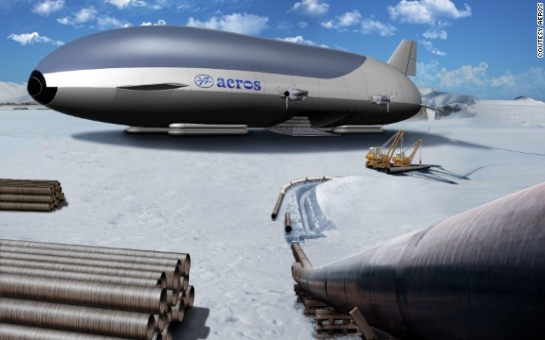Follow us !
Can airships revolutionize transportation in world's harshest environments?
Society
23:29 | 11.12.2013

Can airships revolutionize transportation in world's harshest environments?
Commercial development of the Arctic's natural resources has so far been near to impossible, but transportation throughout the inhospitable region may soon be revolutionized.U.S.-based airship company Aeros and Icelandic airline Icelandair Cargo, say they have signed an agreement with hopes of establishing a partnership to develop new air freight service across the Arctic region.Together they are hoping to deliver standard cargo containers via Iceland to regions with little infrastructure, such as Siberia, Alaska, Greenland and northern Canada."It's a project representing the future of solving the problems of today," Aeros' CEO Igor Pasternak told CNN. "The distribution in the Arctic Circle as it is right now is inefficient and not logical."Managing Director with Icelandair Cargo, Gunnar Sigurfinnsson, said in a press release that he believes Aeros will help transform Arctic transportation forever."We are pleased to begin a partnership with Aeroscraft and jointly explore the expanding market opportunities in Greenland, Iceland, and surrounding Northern territories," Sigurfinnsson stated.The future of airshipsAeros is developing a new cargo airship, the Aeroscraft -- a hybrid dirigible combining elements of regular "lighter-than-air" (LTA) craft and traditional fixed-wing planes.As opposed to existing airship designs, this vehicle can control its own buoyancy and is therefore capable of true vertical take-off and landing without requiring external ballast exchange. This eliminates the need for a runway, airfields and ground crew, which helps sidestep infrastructure development costs.The company, based in California, had test flights with the Aersocraft in September and are now building full-sized prototypes.The aim is to have the first vehicle flying by 2016, and the initial fleet of 24 vehicles up and running by 2020.The rigid-hulled dirigible measures 169 meters in length, and has a payload of 66 tonnes (with plans for a 250 tonne version), a cruising speed of up to 120 knots, and a range of 3,100 nautical miles.One of the Aeroscraft's biggest advantages is that it offers significant fuel savings since it runs on regular diesel, rather than expensive aviation fuel which can be tough to get hold of in more inaccessible regions.READ: How new airline routes are reshaping the worldThe primary focus will be logistical, moving cargo, troops and disaster relief supplies into remote and inhospitable terrain. But the company says that there may also be other uses for the technology in the future, like "floating hotels" to "sky yachts for millionaires."Global game-changersPasternak says he hopes the relationship with Icelandair Cargo will benefit both partners."They are a very innovative airline. Someday they will be our partner; they know the area, and we will be able to do some unique deliveries," the Kazakhstan-born engineer says."It can be everything from delivering the oil rigs to Greenland to bringing milk from England to a Canadian Arctic post."Not only could Icelandair Cargo and Aeroscraft be global game-changers of how air freight services are operated -- the partnership could potentially transform Iceland into an important business and aviation hub."You can imagine that if Iceland becomes the base for the Arctic distribution system, you are creating a new industry in Iceland, which means new jobs and business opportunities," said Pasternak."It would be a high-tech industry. The Aeroscraft has a green footprint and could provide a normal lifestyle to those living in remote areas. We could be creating a whole new understanding of what the Arctic is."(CNN)ANN.Az










